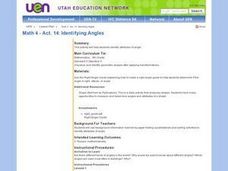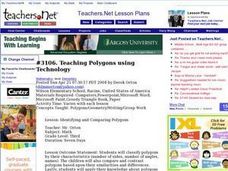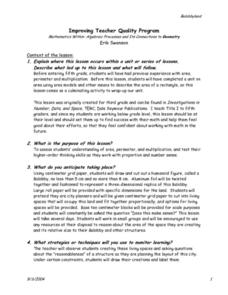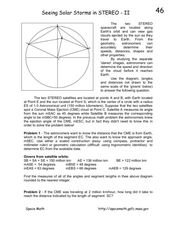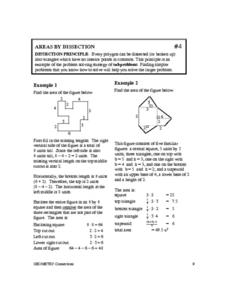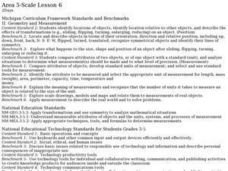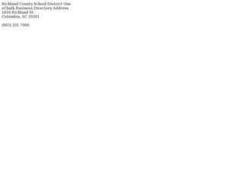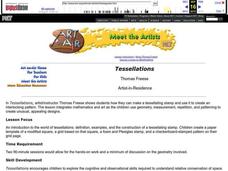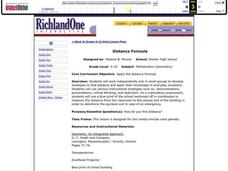Curated OER
Identifying Angles
Fourth graders discuss and examine examples of the different types of angles. After learning the names of the geometric shapes students identify the types of angles and then complete the Kidspiration activity, Identifying Angles.
Curated OER
Teaching Polygons using Technology
Third graders utilize different types of computer programs, such as Microsoft paint and Microsoft Word to study and create different types of polygons. They use PowerPoint to create a story about a shape and others that it meets during a...
Curated OER
Exploring Area and Perimeter
Two students are blindfolded and each receives a cardboard square, one with pompoms glued around the edge and one with pompoms glued all over the surface. They identify what they feel. The class discusses perimeter and area of polygons....
Curated OER
Bedroom Redecoration Project
In this bedroom redecoration project, your young mathematicians become interior designers. They plan, draw, and determine finances for the project. They apply their knowledge of working with decimals, geometric shapes, and problem...
Curated OER
Pythagorean Theorem Spreadsheet
Studetns use a spreadsheet to organize data on the sides of a triangle. They use the Pythagorean Theorem and the If then spreadsheet function to decide whether the three sides determine a right triangle. Young scholars work individual...
Curated OER
Reflections in the Plane
Have your class explore the concept of reflections as they use Cabri Jr. to construct a triangle and reflect it over a line. Learners reflect shapes across the coordinate plane and across the lines y = x and y = -x.
Curated OER
Perimeter
In this perimeter worksheet, students calculate the perimeter of rectangles. This one-page worksheet contains 6 perimeter problems.
Curated OER
Volume and Surface Area of Right Rectangular Prisms
Students identify the formulas for three-dimensional figures. They use manipulatives to model problems. Students create foldables and explain volume and surface area. Students complete worksheets and classify solids. Students sing a...
Curated OER
Balobbyland City Planners
Students create a mini city using proportions that fit a model human they construct using tin foil. They plan the city including a library, sports arena, living spaces, parks and businesses. When constructing the paper buildings, they...
Curated OER
Seeing Solar Storms in STEREO-II
In this solar storms worksheet, students use a diagram given the location of two STEREO spacecraft satellites, a coronal mass ejection, the sun and the Earth to solve 2 problems about the coronal mass ejection. Students use segments,...
Curated OER
Areas by Dissection
In this areas by dissection worksheet, students find the area of given composite figures. This three-page worksheet contains examples, explanations, and 16 problems. Answers are provided on page three.
Curated OER
TE Activity: Pulley'ing Your Own Weight
Students experiment with common objects such as spools, string and soap to determine how pulleys make it easier to move large objects. They look at the difference between fixed and movable pulleys. They examine the many uses engineers...
Curated OER
How to be a Great Navigator!
Students examine historical methods of navigation. They discuss the techniques of "Dead Reckoning," "Heaving the Log," and "Chip Log," pretend to sail from Europe to North America using vectors and determine the location of their...
Curated OER
Scaled Rubber Band Drawings
Students demonstrate the process of creating a scaled rubber band enlargement of a simple drawing. They observe and discuss a teacher-led demonstration, and create a scaled rubber band enlargement of simple drawings and their invention...
Curated OER
Traditional American Indian Lodges
Students explore the mathematical properties of traditional American Indian lodges. They examine the effect of increasing sides of a polygon, calculate the surface area of prisms and cylinders, and construct a classroom size pyramid...
Curated OER
A World of Symmetry
Students identify lines of symmetry. In this symmetry lesson, students create objects and identify their lines of symmetry. They answer questions about lines of symmetry. Students cut shapes out of cookie dough and...
Curated OER
Tessellations
Students learn and review basic geometric terms, definitions, and theory, including regular polygons, lines, angles, points, etc. They make a tessellating stamp and create a repeating work of art.
Curated OER
Distance Formula
Students determine the distance between two points. For this distance formula lesson, groups of students determine the distance between points in real life situations. They calculate the distance from one point in the...
Curated OER
Perimeter and Area of Rectangles
Students calculate the area and perimeter of rectangles. in this area worksheet, students determine the area and perimeter of their classroom. They complete a two-page worksheet by computing area and perimeter.
Curated OER
Geoboard Squares
Students create squares of different sizes on a geoboard. They find and describe a pattern. Students use the pattern to determine the number of squares possible on a 10-by-10 geoboard. They create squares with a horizontal base (and...
Curated OER
Up For Change?
Students explore similar objects. They participate in a series of hands-on, multimedia and online activities to examine how the edge length affects the angle measures, perimeters and areas of similar regular polygons. Students find the...
Curated OER
Circles
In this circles learning exercise, 10th graders solve and complete 20 different problems related to various circles. First, they find the radius and diameter of a circle with a given circumference. Then, students determine the measure of...
Curated OER
Basic Compass and Ruler Construction: Line Segment
In this construction instructional activity, students utilize a compass and a ruler to reconstruct a line segment and to combine two line segments together in 2 questions.
Curated OER
Proving Pythagoras
Young scholars prove the theorem of Pythagoras. For this Pythagorean Theorem lesson, students define the different parts of a right triangle. They use the Pythagorean Theorem to solve for the missing sides and angles of a right triangle.


